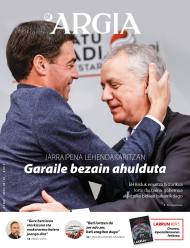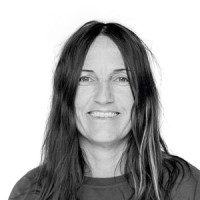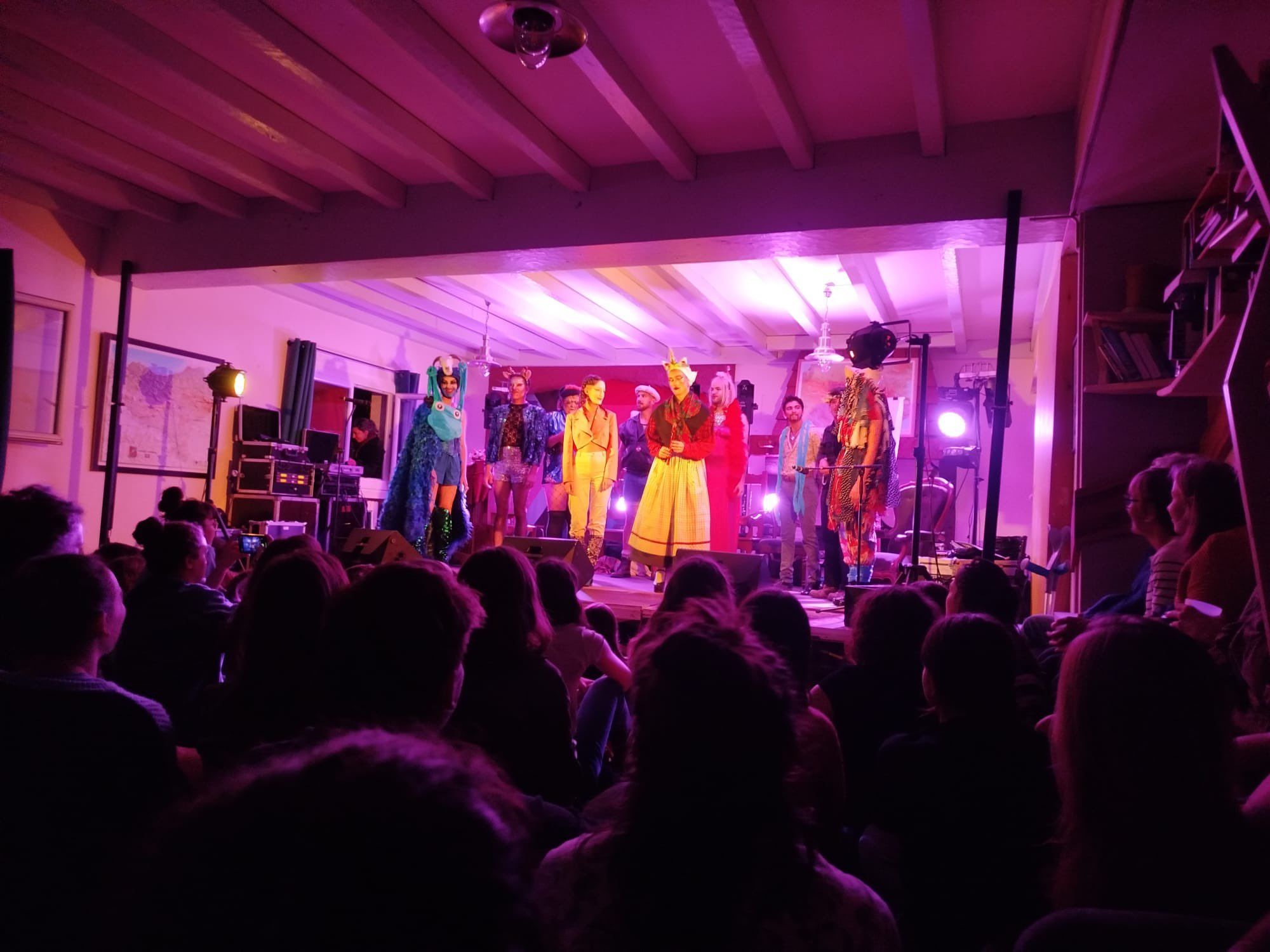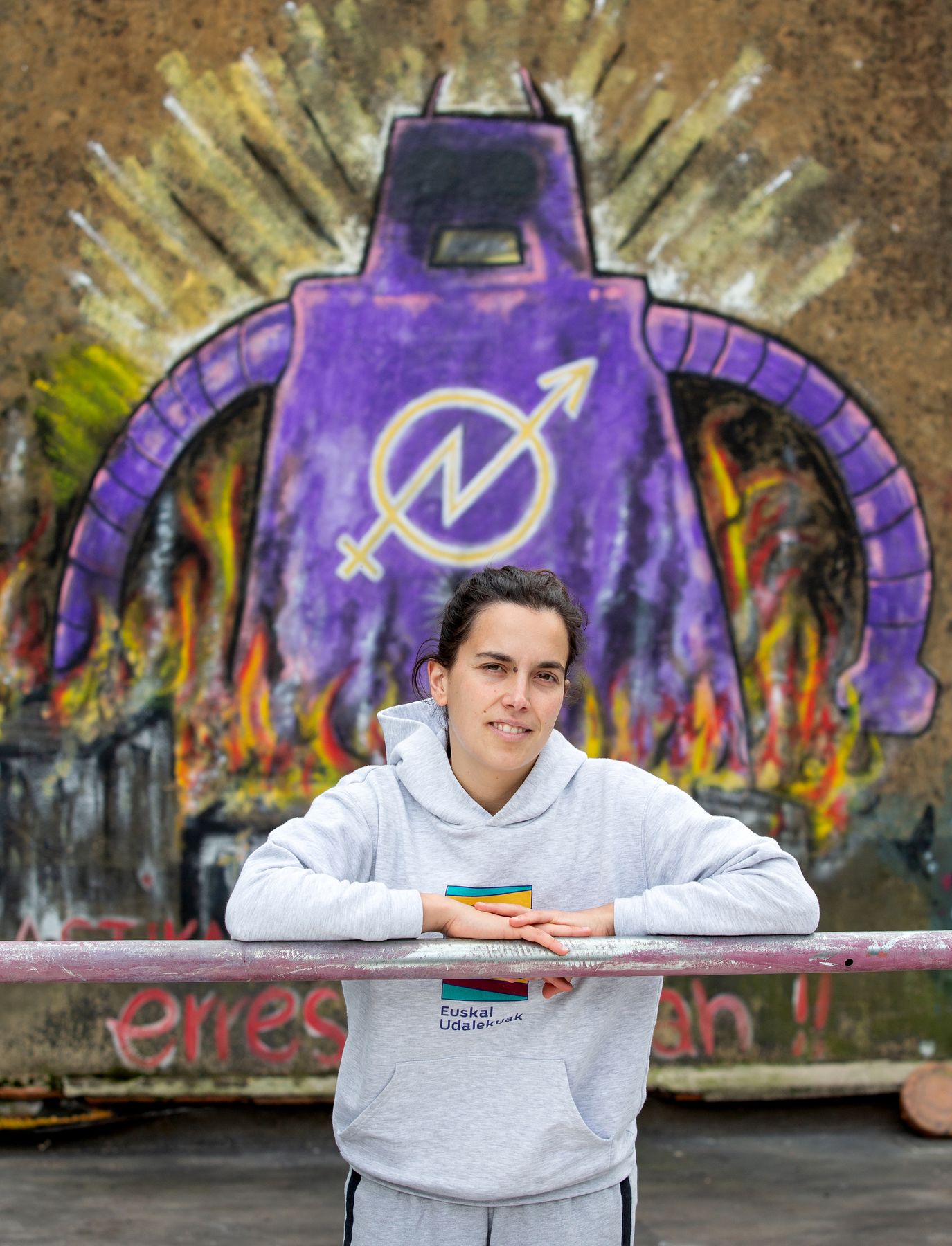Quote to place the person in the middle
- During the 26th, 27th and 28th of April, the gathering of the Basque Country’s basins in Leitza was over. These are open days for pastries as their name clearly indicates, but in general all sex/dissident gender is recommended. Along with a rich and varied program, they will have a date to reflect in groups and to dress in a safe and healthy environment. Besides focusing on current questions, debates and challenges, they will also look at the past, thanking and acknowledging those who organized the first lesbian encounters in the Basque Country 40 years ago.
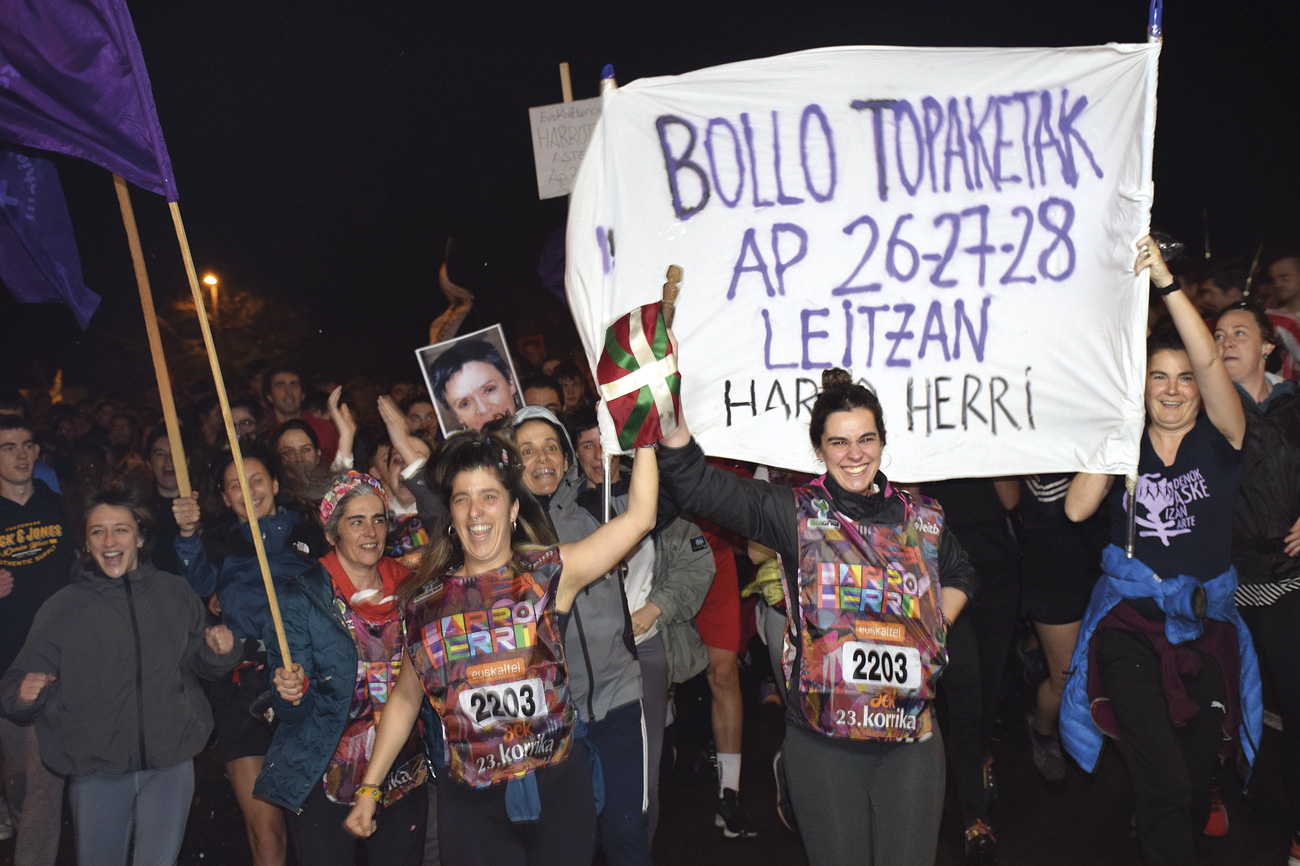
Leitza will become the meeting point of the Euskal Herria basins on April 26, 27 and 28. Countless people have pointed to the Bollotopakets and over the weekend some 550 chapels will join to reflect on this identity. Primary and dissidents gender/gender: "All hetero-dissidents will be welcome, but the central content will be the bollerism, that is, the bull subject, his genealogy, the current political situation and the challenges we have," explains one of the organizers to the interviewer of Emaraun magazine. That, in view of the fact that all registration forecasts have been exceeded, they respond to an unquestionable desire. Because the days organized for this political subject and for him are not common in the Basque Country.
In spite of the changes in the terms to denominate this correspondence, in the past there have been meetings with the same objective: the "Lesbian Encounters of the Basque Country" of 1983, the "Lesbian Encounters of the Basque Country" of 1987, the "Lesbian Encounters of the Basque Country" of 1997 and, later, other more local ones. 40 years after the first edition, the members of the transfeminist group Bollurria bollera began last year to represent the Bollotopakets with the intention of marking this anniversary.
The organizers know that the former butchers, avoiding anachronisms, are often owed by feminist lesbians back then. The quote will also be noteworthy: "These people deserve the collective recognition of their contributions and their struggle, and we hope that the echo of the tribute will reach all the people who began their journey at that time, even those who do not have the opportunity to be present," said Argi Lertxundi, of the organizers. The long journey of these first meetings of Zamalbide (Errenteria), 21 and 22 May 1983.

Speaking with Nati Ruiz, in the organization of the time, it is clear to us the strength, the courage and the courage of the schedules. Because at that time lesbians were neither seen nor named. "If two women show up together, they were friends. Friends did, but we wanted to show that we were friends that we had sex together. Our primary goal was spectacularity, because what you don't see doesn't exist." In a context in which these relations were legally punished, the Law of Dangerousness and Rehabilitation that punished homosexuality stood in the Spanish State until 1978, when homosexual relations were condemned in the French State until 1982. In addition to being legally penalized, they were classified as sick and abnormal: homosexuality was classified into diseases by the World Health Organization until 1990.
Therefore, despite the need, they were not given a small step: "One of us always said that the banner will not be brought forward by itself, it has no wheels for the moment!" We had to show the face and those of us who were willing to do so were few." Truffles, insults, judgments and attacks from others were rewarded: "We were like a circus, there were more people looking at the manifestation than manifesting." All the sexual liberation activists of Euskal Herria recall the murder of the famous Errenteria transvestite, ‘Francis’ Vicente Vadillo Santamaria. On 10 June 1979, a police officer shot dead at the Apolo discotheque of Errenteria. The demonstrations to denounce this murder were the first public and political initiatives in the Basque Country in favor of the rights and freedoms of gays and lesbians. The Euskal Herria Gay and Lesbian Liberation Movement EHGAM, formed in 1977, was the main engine.
“We want to defend lives that are outside the privileges of regulatory dynamics”
Ibis Ugarte
To achieve this spectacularity, the first meetings between activist lesbians were organized: “Visibility was our maximum demand, and in this way we were interested in finding ourselves among different groups to reach consensus on demands and objectives. We wanted to extend ours and we knew that together we would have more strength,” Rufo says. About 250 people met in Errenteria.
But where would that correspondence have influenced? From the EHGAM movement? Since the beginning of the feminist movement in the field of militancy? Self-organizing lesbians among feminists? "There we had the debate, where we could provoke more, and there were contradictions in both. For us, EHGAM was a very masculine movement, and at that time feminism had acted very heteronormatically, surely because of the situation itself," said Pilar Mendibil Pilón to ARGIA in that 2019 interview. In the end, they did not rule out influencing the feminist movement, but added the step to organize among feminist lesbians. In 1985, for example, the Group of Feminist Lesbians of the Basque Country was created, which in previous years would be the meeting point of territorial collectives.
Despite the age of 40, collaboration and union with the feminist movement remain important elements of the dynamic. In fact, the Bollotopaks have also matured since transfeminism, and many of the members of the organizing assembly are involved in the feminist movement.
The Golden Trio EHGAM will offer this year to the attendees of the Basque Lesbian Encounters in 1983. “With this Golden Trio we wanted to value the knowledge of our genealogies and collective referents and recognize the leadership of these people in the LGBTI+ struggle. All too often, lesbian activists in the LGTBI+ liberation struggle have been kept in the background and in secret, an easy way to thank and reward the momentum given to this movement in general." Although in Usaia the prize will be given on the occasion of 28 June, this year they will do so in the Bollotopeos, with the aim of "giving collective meaning and celebration to the recognition".
If we ask ourselves about the goal of visibility then, Ibis Ugarte, from Bollotopaketas, says: "Although social recognition of practices has increased, we want to defend the lives that remain outside the privileges offered by regulatory dynamics to put non-normative practices at the centre. To do so, other life models of lesbianism should contemplate spectacularity, more specifically those that make the market and the system uncomfortable.”
“Spectacularity was the highest demand (1983), and in this sense we were interested in meeting
groups” Nati Rufo
Lesbian feminist boller
That is why the lesbian has been displacing the subject "bollera". Although the use of the term lesbian dominates society, some individuals call its existence with the word "bollera": "To somehow define it, we can say that the bollera is a political position that has its origin in lesbian desire, but that goes beyond. Bollerism opens up opportunities to give up the heterosexual system that generates men and women and proposes a new possible identity. Returning to this new identity, the painters are not women who break with women, because bolle is a political category created to give up the imposed femininity," the organizers say.
The struggle of the ancestors has made invisibility increasingly visible, and in the path of recognition have gained the changes of mentalities and laws. If 40 years ago it was a rupturist to locate oneself in lesbianism and publish as a lesbian, preferring normalization and recognition, some political lesbians have been relocating the revolutionary sense, jumping from the subject "lesbian feminist" to the "bolle". Basically, in order to realize the identity of the logger in the group and politically, they will address this subject the main conference of the weekend, which will be one of the main appointments of the weekend.
.jpg)
An evolution that aims to reflect the Bollology found in the Bollotopeos. Exposition of a visual genealogy of the Basque Country Movement. Four people in the Assembly have participated in the exploration of archives and have generally been organized autonomously and by groups. They have developed a programme based on self-management and horizontality: "The agenda items reflect the political concerns and interests of the members of the organization. They propose pulling the knots and challenges identified in the assemblies," says Ugarte. In November last year, topics were listed and working groups formed on the basis of individual interests, with the idea of working on the offer autonomously. Workshops, conferences, documentaries, podcasts, exhibitions... after six months a rich harvest has been brought to them. The group of themes to be discussed during the weekend is very varied: the realities of the ravens of small and rural villages; the struggle against the essentialist movement terf; power and sexuality; the drag workshop; the selected housing; the violence between the ravens; the ravens and old age; the grids and the nuclear family; the posture of looking at Palestine from transfeminism creation of the world show,
“Those who
organized the first meetings 40 years ago deserve collective recognition of their contributions and struggle”
Argi Lertxundi
To keep knitting red
Despite 40 years of age, penetration is one of the components that remains very important. Despite having advanced in the spectacularity and normalization of Lesbians, the heteronormalized society has become such a strong, rigid and imposed society as ever. Education, legislation, imaginaries, policies, creations, the media, words, ideas, decisions -- it's all the support and encouragement of this rule. A reality in which lesbian women and more women workers need vigilance and strength, and in which bullfighting networks are of great importance. This was also the objective of the organizers of the Bollotopada. "Participatory processes and open assemblies have been of great importance. (...) When the days come, it will be time to enjoy and feel proud of what has been done, and it will be the right time to deepen these alliances," says Ugarte. About 70 people have been gathered in the assemblies of different places in the Basque Country, both in the city and in typical villages.

Rufo has devoted a great deal of time to the need for penetration in the late 1970s. There was everything to do: there was nothing and they had to create and complete the network. They organized tertulias to strengthen the group through lesbian reflections: "It was essential to reflect in a group. We got a number of pamphlets and thought about it. For example, we devoted a lot to obtaining German and English texts on the condition of butch-fem. In the end, if we didn't talk, because we didn't know many things." Another topic of sexuality, because at the time there was no space to share questions, ideas and reflections about affective-lesbian sexual relations. In this sense, Sorginak Journal was the main tool and reference. It was founded in 1986 and lasted until 1995. Later, between 1998 and 2000, it was reedited. She agglutinated most of the feminist lesbian creations of the time in Euskal Herria – poetry, photography, humor, theoretical reflection…– and international reflections were also an instrument for Basque repatriation.
“Participatory processes and open assemblies play a fundamental role. The Bollotopacos will be the time to enjoy and feel proud of what has been done”
Ibis Ugarte
Rufo remembers that the festival had "major importance" for penetration. It facilitated the approach to the unknown: "We started organizing parties (Donostia) at the place we had in Calle Duque de Mandas de Atotxa. People knew it and started coming from the small towns of the area (Alkiza, Tolosa...). These meeting places were indispensable to unite the isolated women: to come and meet others, to feel that they were not alone, to protect themselves, to partner, to link… All this brought the parties spaces".
Listening to the dynamic and program of the Bollotothos, Rufo is encouraged to come to Leitza. "We needed visibility and we made ourselves spectacular, we had demands and we demanded. We managed to open new roads, but they still have to be opened. I have done my best. We have done our part and we have passed the witness and we are moving forward by adding new ideas and demands." The compass will look to the future and the witness will be proudly shaken during the weekend in the middle of the Plaza de Leitza.
When the heteropatriarchal capitalist colonial system is questioned and fought, it attacks mercilessly. Using all the tools at your disposal to strengthen, strengthen and consolidate institutional power, media, justice, language, culture, violence...
In Switzerland, where every... [+]
Baionan Loverdose eta Atharratzen Bekat’uros egin den bezala, Oztibarren (Nafarroa Beherea) Debrien Figurak feminismoaren eta transfeminismoaren inguruan antolatutako egunak arrakasta izan du.
Bitxi Bitxi queer kolektiboa sortu dute hogei bat kidek berriki Baionan. Queer izatea, heteronormatibitatetik kanpo izatea da besteak beste. Baita genero ezberdinen adierazpena sustatzea ere.









